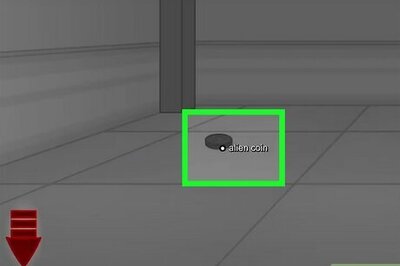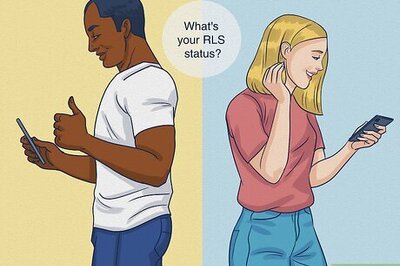
views
- In addition to introducing yourself right away, make sure you're positive, helpful, and supportive of other students.
- Show your teacher you're a great student by participating in class, keeping up with your work, studying, and getting help when you need it.
- Follow your teacher's rules carefully, listen to your teacher when they're instructing the class, and let them know when a classmate is being disruptive.
Being Friendly and Helpful

Introduce yourself at the first opportunity. Talk to the teacher for a minute or so if possible. This shows that you aren't afraid to socialize and that you have confidence. Most teachers like a student with a lot of confidence. Try to find something you both have in common. If your school is online due to the COVID-19 pandemic get to class early and start up a conversation. Walk up to your teacher confidently, make eye contact, extend your hand, and say something like “It’s nice to meet you, Mr. Reed. I’m Jane Smith, and I’m really looking forward to Algebra class this year. Actually, I think you had my older brother in class — do you remember Joe Smith?”

Put on a happy face. Smile at every reasonable opportunity. Teachers love happy students. It is important to look like you’re enjoying yourself (even if you're not always!) during class. Some people recommend “dressing for success” as a student — that is, wearing slightly more refined, stylish clothes than comfy sweats, etc. — in order to make a good impression. This is an option, but a nice smile is the easiest (and cheapest) way to make a good visual impression.

Keep a positive attitude. Things aren’t always going to go your way, in class or outside it. Don’t let temporary setbacks sour your mood and appearance, though. Do your best to avoid complaining, whining, or frowning. Teachers (like the rest of us) find it easier to get along with a positive person. Negativity spreads, but being positive spreads, too. If you get a “C” instead of the “B” you expected on a test, don’t gripe and groan about it for the whole class period. Use it as an opportunity and motivation for improvement, and let your determination and confidence show.

Volunteer to help out. Don’t be shy. If the teacher asks for a volunteer to hand out study sheets or clean the chalkboard, raise your hand. And do it with a smile. Show the teacher that you’re engaged in class and dependable. You can even offer to help out without the teacher asking for volunteers. It’s best to do this discretely, either before or after class. Otherwise, other students may become annoyed with you. Also, don’t insist upon helping out when the teacher says “Oh, that’s OK” — or you may begin to frustrate the person you’re trying to impress!

Assist other students. Teachers are always outnumbered in the classroom, and therefore are almost always receptive to a helping hand with students who need a bit of assistance. If you have a knack for the topic being covered or the current activity, offer to help out another student who is having a more difficult time. Be considerate, though — don’t force your “help” upon a hesitant teacher or an unwilling student. For instance, if you’ve finished with your classroom lab project, go up and ask your teacher if you can give a bit of assistance to a classmate who seems to be struggling with the project. Or, offer to do some peer tutoring outside of class if you’ve really got a good handle on the material.
Trying Your Best

Come to class ready to learn. Before school begins for the day, make sure you’ve completed all your work and have it ready to go. Before class begins, organize everything you need and prepare yourself mentally and physically to listen and participate. Have your notebook out, your pencils sharpened — or your laptop fully charged, whatever the case may be.

Participate in class. Actively participating—by asking good questions, making eye contact, and being involved in classroom discussions—shows that you are trying your best to understand what your teacher is talking about. During the COVID-19 pandemic, if possible keep your camera on at all times and nod along to what they are saying. Ask questions and don't be afraid to get the question wrong. All good teachers understand that mistakes are valuable but if they don't believe that you are trying to impress the wrong person. It also indicates that you are prepared and listening in class. Don't hesitate to ask questions if you don't understand something. Your teacher will be more than happy to help you. This implies that you want to learn and that you strive to do well in school. However, it is possible to ask too many questions — if you seem to be interfering with class or frustrating your teacher, jot down your questions and bring them up after class or (if available) by email, etc. Generally speaking, though, it is better to ask too many questions than too few.

Stay on track with your work. Constantly falling behind on assignments, homework, and projects does not create a good impression. But doing your work on schedule — or even a bit ahead of schedule when possible — shows your teacher that you’re giving an honest effort to succeed. Dedicate yourself to turning in assignments on time. Late work can result in punishments, and your teacher won't be happy either. Turning in your first assignment late isn't a good way to make a good first impression. If you’re having trouble keeping up due to the difficulty of the work or some other factors, talk to your teacher about it immediately.

Study diligently. Work hard in preparation for tests. If your studying results in A's on every test, great. But even if your hard work doesn’t achieve those highest marks, your teacher will take notice of (and appreciate) your ongoing effort toward improvement. A very effective method to studying is to study for 20 minutes, rest for 5, and every fifth break should be 20 minutes long. It is also scientifically proven that chewing gum can help you focus. Just don't chew in class! If your studying doesn’t seem to be producing the results you expect, seek out advice on improving your technique. Teachers are usually eager to give out study tips — but you have to ask first.

Ask for help when you need it. Seeking out study tips is one of many ways to ask for advice and assistance from your teacher. If you just can’t wrap your brain around a certain formula, or comprehend what Hamlet is talking about in that soliloquy, don’t be too proud or too embarrassed to ask for your teacher’s help. Most teachers entered the profession because they wanted to help kids learn — so give them the chance! Asking for help is a sign of strength, not weakness. It shows that you are determined to give your best effort — and teachers value all-out effort from students above practically any other quality.
Following the Rules

Know and obey the classroom rules. Be on your absolute best behavior, especially for the first few weeks of school. Sit quietly. Don’t pass notes. Keep your phone silent and in your bag. Always raise your hand before speaking. Put your lab equipment away properly. Ignore the lovebirds whispering sweet nothings to each other behind you. Don’t test the rules to see what you can get away with. Let some other kid do that. Focus on impressing your teacher with your knowledge of and adherence to the classroom rules. This demonstrates maturity, respect, and diligence.

Avoid tardiness and distractions. Don’t let yourself think that others’ conversations or hijinks give you license to do the same. Keep your primary goal — learning — in mind. Brush aside distractions, and never become a classroom distraction yourself. You will be a distraction, and you won’t be ready to learn, if you show up late to class. Do everything you can to make it to class on time, if not early. Unless you have a truly legitimate reason for being late, don’t try to make excuses. Be as discreet and quiet as possible as you take your place in class, and give an apologetic look to your teacher.

Listen attentively to your teacher. If you want to make a good impression! Having to ask the teacher to repeat something can be embarrassing and indicates that you don’t care enough to give your best effort. If you’re having trouble keeping focused during class, ask to be moved to the front row. This is especially helpful if other students are distracting you, or if you have any kind of hearing or vision difficulties. Talk to your teacher about other possible solutions if necessary.

Tell your teacher about problems in class. Nobody wants to be the kid who tells the teacher about every little thing other students do wrong — this is the easy way to get labeled the ”teacher’s pet” or a “snitch” by your classmates. So, yes, use your judgment in deciding what to report and what to let slide. But, when you know something disruptive or otherwise wrong is going on, report it quietly to your teacher. Don’t raise your hand and blurt out “Mrs. Magowan, Sam and Max are talking instead of paying attention.” Instead, wait until after class and discreetly voice your concerns about the distraction they are causing you and others. If, however, Sam and Max are playing around recklessly with the Bunsen burner, inform your teacher right away.




















Comments
0 comment